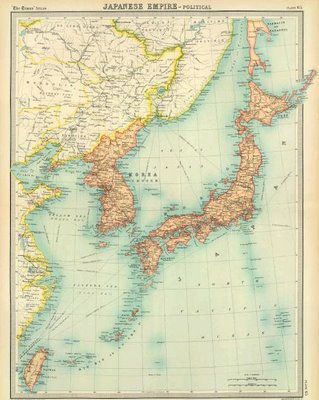
I read a book back in college that mentioned, among other things, that even after defeat in August 1945, the erstwhile Imperial Japanese rulers appealed to the Allies that Japan be allowed to "retain Korea." I recently sought to find a link to this, and while I couldn't immediately find one for a post-Hiroshima/Nagasaki reference, it is clear that Imperial Japan sought to "retain Korea" after the war ended, presumably with their defeat (the link I just provided is also interesting as a 2000 discussion of the same efforts to sanitize past Japanese wrongdoing and legitimize Imperial aggression that we saw later).
In fact, however, even just before the defeat in 1945, Imperial Japan was still committed to a policy of “reserving Korea to Japan,” i.e., retaining Korea as a Japanese colony: these facts are clear from documents made public by the Japanese government. (See the section “Territory to Be Yielded” in the document “Policy on Negotiations with the USSR,” dated May 14, 1945, drawn up by the Supreme War Leadership Council.)++ To ignore these facts and describe Imperial Japan as if it had been a leader in the liberation of the colonies is to distort history, to construct a “modern myth.”My point here is not to dredge that up, since it has long been a matter of public record. Rather, the whole situation got me wondering about what would have happened had a defeated Japan succeeded at "reserving Chōsen (Korea) to Japan."
++The Supreme War Leadership Council was established in August 1944. Its members were the Prime Minister, the Foreign Minister, the Army Minister, the Navy Minister, and the Chiefs of the Army and Navy General Staffs. The Showa Emperor also attended the meetings when important matters were discussed. The section “Territory to Be Yielded” stated that in order to succeed in its negotiations with the U.S.S.R, Japan would need to begin to prepare to return Southern Sakhalin to the Soviet Union, renounce fishing rights there, re-open the Straits of Tsugaru (between Honshu and Hokkaido), and cede Japanese railroad rights in Northern Manchuria; Japan, however, would retain Korea.
There likely would have been no Korean War as we know it, but perhaps there would have been a guerilla war. Maybe a direct confrontation between China and Japan may have erupted by now, dragging the United States in with it. Maybe the United States, being right next door to northern China, would have been in a better position to help defeat the Communists in their battle with the Nationalists, and China would never have been communized.
Would Korea have eventually developed as it has, or would it have remained a backwater for "mainland Japanese" to economically exploit? Would some way have been found—a la the American colony of the Philippines or the British colony of India or the Portuguese colony of Macau or East Timor—for Korea to eventually be free from Japanese rule? What would the country be like? Would it be a land of Japanese-speaking hanbok wearers? Would it be like Okinawa, with much of its indigenous culture gone, replaced by mainland Japanese culture?
No comments:
Post a Comment
Share your thoughts, but please be kind and respectful. My mom reads this blog.